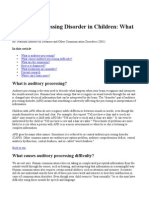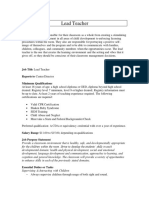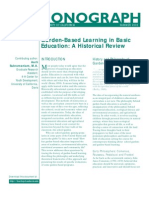0 ratings0% found this document useful (0 votes)
49 viewsAPD Fact Sheetv2
APD Fact Sheetv2
Uploaded by
Marco Antonio Peña RiveraTreatment involves environmental modifications, compensatory strategies, assistive devices, and therapy to improve auditory processing skills.
Copyright:
© All Rights Reserved
Available Formats
Download as PDF, TXT or read online from Scribd
APD Fact Sheetv2
APD Fact Sheetv2
Uploaded by
Marco Antonio Peña Rivera0 ratings0% found this document useful (0 votes)
49 views1 pageTreatment involves environmental modifications, compensatory strategies, assistive devices, and therapy to improve auditory processing skills.
Original Title
APD_Fact_Sheetv2
Copyright
© © All Rights Reserved
Available Formats
PDF, TXT or read online from Scribd
Share this document
Did you find this document useful?
Is this content inappropriate?
Treatment involves environmental modifications, compensatory strategies, assistive devices, and therapy to improve auditory processing skills.
Copyright:
© All Rights Reserved
Available Formats
Download as PDF, TXT or read online from Scribd
Download as pdf or txt
0 ratings0% found this document useful (0 votes)
49 views1 pageAPD Fact Sheetv2
APD Fact Sheetv2
Uploaded by
Marco Antonio Peña RiveraTreatment involves environmental modifications, compensatory strategies, assistive devices, and therapy to improve auditory processing skills.
Copyright:
© All Rights Reserved
Available Formats
Download as PDF, TXT or read online from Scribd
Download as pdf or txt
You are on page 1of 1
Audiology & Speech Center
225 South Main Street
Polsky Bldg. Rm. 181
Akron, Ohio 44325-3001
Appt. Line: 330.972.5894
Auditory Processing Disorder: Fact Sheet
Characteristics of Auditory What is an Auditory Processing Disorder?
Processing Disorders
An auditory processing disorder is a condition in which the brain’s
Difficulty following multi- interpretation of sounds is adversely affected. Individuals with auditory
step directives processing disorders (APD) often do not recognize subtle differences in
sounds of words even though the sounds are loud and clear enough. This
Trouble understanding in difficulty becomes more pronounced in noisy or adverse listening
noisy listening environments or when listening to complex information.
environments
What is the prevalence of APD?
Poor listening skills
Some research has suggested a prevalence of 2-3% in the pediatric
Academic performance population (Chermak and Musiek, 2001), with other estimates at 3-5%
does not match ability (Santucci cited in Matson, 2005). A 2:1 ratio of boys to girls has also been
cited.
Struggles to pay attention
Evaluations and Best Practices
May exhibit auditory
memory issues A full hearing assessment must be conducted before an auditory processing
evaluation can be performed. APD evaluations should only be performed on
Need more time to
children age 7 or older due to the complexities of the tests. Exceptions to
process auditory
this recommendation may be made after consultation with other pediatric
information
specialists including, but not limited to, speech-language pathologists and
Difficulty with reading, psychologists.
spelling, math word Who should be referred?
Date of Sale: 00/00/00
problems and vocabulary
Any child who appears to not be hearing well should first be referred for a
Disorganized
Describe yourand forgetful
location by hearing assessment. If hearing is normal, an auditory processing screening
landmark or area of town. should be performed. Children with medical history’s that indicate frequent
Tire easily when engaged
in listening tasks for middle ear infections, hyperbilirubinemia, problems with attention or focus,
extended periods or the other characteristics listed on this fact sheet should be referred. Note
that many of the behavioral complaints seen with children with ADD/ADHD
May have problems with are similar to those seen with APD.
receptive language or
Treatment Options
comprehending abstract
information Treatment options are determined based on the specific auditory deficits
that exist for each child. Treatment plans typically consist of environmental
Often look for visual cues
modifications, compensatory strategies, assistive listening devices to
to help “fill in” gaps they
improve access to auditory information and auditory training or therapy.
miss through oral
information
Street Address For additional information please visit:
Address 2
Become frustrated
City, and
ST ZIP Code http://www.asha.org/public/hearing/Understanding-Auditory-Processing-Disorders-in-Children/
may exhibit behavior
Ph: 555.555.0125 http://www.medicinenet.com/auditory_processing_disorder_in_children/article.htm
problems
Web site address
You might also like
- The Partners 20 Minute Guide (Second Edition)Document122 pagesThe Partners 20 Minute Guide (Second Edition)The Center for Motivation and ChangeNo ratings yet
- Auditory Processing DisorderDocument2 pagesAuditory Processing Disorderapi-525404544No ratings yet
- MGMT 601 Assignment 2 Case AnalysisDocument11 pagesMGMT 601 Assignment 2 Case AnalysisGundeep100% (1)
- Audiology Now (Issue 21 2005) Cameron DillonDocument9 pagesAudiology Now (Issue 21 2005) Cameron DillonMonya MohaNo ratings yet
- Auditory Processing DisorderDocument4 pagesAuditory Processing DisorderRuztiqa Kasih Pramudya Vardani100% (1)
- Apd Whitepaper MyoungDocument12 pagesApd Whitepaper MyoungSherin ManojNo ratings yet
- Auditory Processing Disorder ApdDocument9 pagesAuditory Processing Disorder Apdapi-360330020No ratings yet
- ED474303Document7 pagesED474303bitcoinsindoNo ratings yet
- Differential Diagnosis & Intervention of Central Auditory Processing DisordersDocument134 pagesDifferential Diagnosis & Intervention of Central Auditory Processing DisordersNicol Bustamante CarrilloNo ratings yet
- Multihandicapped Rehabilitation Wps AshishDocument3 pagesMultihandicapped Rehabilitation Wps AshishAshish SinghNo ratings yet
- VC VC VC VC: Click On Your Question:cDocument10 pagesVC VC VC VC: Click On Your Question:cNurul IqasNo ratings yet
- Sensory ImpairmentsDocument17 pagesSensory Impairmentskamathavani1004No ratings yet
- Central Auditory Processing DisordersDocument3 pagesCentral Auditory Processing DisordersGina Mae RodriguezNo ratings yet
- CAPD Check ListDocument12 pagesCAPD Check ListCaio LeônidasNo ratings yet
- Auditory Processing Disorders Management & RemediationDocument60 pagesAuditory Processing Disorders Management & Remediationnhusna.mnorNo ratings yet
- EducationDocument8 pagesEducationMalibog AkoNo ratings yet
- Speech Sound Disorder (Autosaved)Document14 pagesSpeech Sound Disorder (Autosaved)Harsh SainiNo ratings yet
- Auditory-Verbal Therapy For Children With Hearing ImpairmentDocument6 pagesAuditory-Verbal Therapy For Children With Hearing ImpairmentjavierNo ratings yet
- Children Who Are Deaf or Hard of Hearing PLUSDocument6 pagesChildren Who Are Deaf or Hard of Hearing PLUSalfanNo ratings yet
- Ndcs A Parents Guide 2021Document7 pagesNdcs A Parents Guide 2021jamesrengaNo ratings yet
- Debonis 2008Document17 pagesDebonis 2008waslacson17No ratings yet
- Hearing Aid Fitting in ChildrenDocument25 pagesHearing Aid Fitting in Childrenankesh singh100% (1)
- Role of Speech Language Pathology Center in Speech Language Therapy of HI (Hearing Impaired) ChildrenDocument24 pagesRole of Speech Language Pathology Center in Speech Language Therapy of HI (Hearing Impaired) Childrennida batoolNo ratings yet
- Characteristics and Identification of Learners With Hearing NeedsDocument4 pagesCharacteristics and Identification of Learners With Hearing NeedsCarvingBrain.comNo ratings yet
- Gambaran Hasil Skrining Pendengaran Pada Pasien Dengan Keterlambatan Bicara & Bahasa Di Poliklinik THT-KL RSUP Sanglah Periode Januari-Desember 2017Document5 pagesGambaran Hasil Skrining Pendengaran Pada Pasien Dengan Keterlambatan Bicara & Bahasa Di Poliklinik THT-KL RSUP Sanglah Periode Januari-Desember 2017rezkiwjNo ratings yet
- LDExplained Learning DisabilitiesDocument59 pagesLDExplained Learning Disabilitiesbhupendra kumarNo ratings yet
- Sebm AbstractDocument2 pagesSebm Abstractapi-508842745No ratings yet
- N.S. DISORDERS - Central Auditory Processing DisorderDocument11 pagesN.S. DISORDERS - Central Auditory Processing DisorderKendra SchalowNo ratings yet
- Clinical Practice: The Approach To The Deaf or Hard-Of-Hearing Paediatric PatientDocument5 pagesClinical Practice: The Approach To The Deaf or Hard-Of-Hearing Paediatric PatientCarlos Alberto CastañedaNo ratings yet
- The Listening Child: What Can Go Wrong: What All Parents and Teachers Need to Know About the Struggle to Survive in Today’S Noisy ClassroomsFrom EverandThe Listening Child: What Can Go Wrong: What All Parents and Teachers Need to Know About the Struggle to Survive in Today’S Noisy ClassroomsNo ratings yet
- Auditory Symptoms and Psychological Characteristics in Adults With Auditory Processing DisordersDocument6 pagesAuditory Symptoms and Psychological Characteristics in Adults With Auditory Processing DisordersBagoes AsNo ratings yet
- Learners With Difficulty Hearing Communicating W ASDDocument16 pagesLearners With Difficulty Hearing Communicating W ASDPrincess Lyn SoloriaNo ratings yet
- Learning Difficulties: Auditory Processing DisorderFrom EverandLearning Difficulties: Auditory Processing DisorderRating: 3 out of 5 stars3/5 (1)
- Test GammaDocument5 pagesTest GammaPamela LacentvaneseNo ratings yet
- Auditory Training in Autism Spectrum DisorderDocument6 pagesAuditory Training in Autism Spectrum DisorderLuis SeixasNo ratings yet
- Speech Sound Disorders (SSD)Document14 pagesSpeech Sound Disorders (SSD)Ayushman KhatriNo ratings yet
- Speech Delay in Toddlers Are They Only Late TalkerDocument9 pagesSpeech Delay in Toddlers Are They Only Late TalkerJayantiNo ratings yet
- Clear As MudDocument6 pagesClear As MudLivia Almeida RamalhoNo ratings yet
- PeatcDocument3 pagesPeatclourdwsNo ratings yet
- Capd HandoutDocument3 pagesCapd Handoutapi-302267315No ratings yet
- Difficulty in Hearing: Prepared By: Francis Quarre Lyka Jane Roguel John Lester Romero Alana Marees DolosoDocument31 pagesDifficulty in Hearing: Prepared By: Francis Quarre Lyka Jane Roguel John Lester Romero Alana Marees DolosoJessa Mae SusonNo ratings yet
- PedsinReview EarlyidentificationDocument14 pagesPedsinReview EarlyidentificationPranay PandeyNo ratings yet
- Patients With Special NeedsDocument75 pagesPatients With Special Needsgynsvnrvd7No ratings yet
- Hearing Screening Pediatrics 2009Document14 pagesHearing Screening Pediatrics 2009Francisco ValleNo ratings yet
- Habilidades Auditivas em Crianças Com Dislexia e Transtorno Do Déficit de Atenção e HiperatividadeDocument6 pagesHabilidades Auditivas em Crianças Com Dislexia e Transtorno Do Déficit de Atenção e HiperatividadeJoaquim Barbosa AguardemNo ratings yet
- School Age Hearing Screening DMIMSUDocument11 pagesSchool Age Hearing Screening DMIMSUSharnie JoNo ratings yet
- Universal Newborn Hearing Screening in India 1588571456 PDFDocument3 pagesUniversal Newborn Hearing Screening in India 1588571456 PDFSomya RainaNo ratings yet
- Final Examination Sped 605Document10 pagesFinal Examination Sped 605Nazardel alamo100% (1)
- Functional Assessment of Children With DeafblindDocument50 pagesFunctional Assessment of Children With DeafblindpaulpramiladeviNo ratings yet
- A Simple Guide to Auditory Processing Disorder, Diagnosis, Treatment and Related ConditionsFrom EverandA Simple Guide to Auditory Processing Disorder, Diagnosis, Treatment and Related ConditionsNo ratings yet
- 225 FullDocument8 pages225 FullCarolina Sepulveda RojasNo ratings yet
- Pseudohypacusis 20070404Document5 pagesPseudohypacusis 20070404alavika100% (1)
- Learners With Difficulty in HearingDocument3 pagesLearners With Difficulty in HearingPortes, Hannah GraceNo ratings yet
- Auditory NeuropathyDocument4 pagesAuditory Neuropathychipta lestariNo ratings yet
- Auditory Processing Disorders I: Definition, Diagnostic, Etiology and ManagementDocument29 pagesAuditory Processing Disorders I: Definition, Diagnostic, Etiology and ManagementCaio LeônidasNo ratings yet
- PrevalenciaDocument4 pagesPrevalenciaLaura Sofía Miranda RellánNo ratings yet
- Hearing ImpairmentDocument14 pagesHearing Impairmenteupharity2237No ratings yet
- Louise LevyDocument47 pagesLouise LevyNAA NYC Metro ChapterNo ratings yet
- Disability Snapshot Fact SheetDocument2 pagesDisability Snapshot Fact Sheetapi-260469323No ratings yet
- Speech-Delay Delay Delay 6677Document2 pagesSpeech-Delay Delay Delay 6677billybam2285No ratings yet
- 2019 - Hearing Loss in The CommunityDocument50 pages2019 - Hearing Loss in The CommunityVaenusha MuruganNo ratings yet
- AQA (A) A2 Psychology. Unit 3, Topics in Psychology. 1, - Lawton, Jean-Marc - 2009 - London - Philip Allan - 9780340991763 - Anna's ArchiveDocument116 pagesAQA (A) A2 Psychology. Unit 3, Topics in Psychology. 1, - Lawton, Jean-Marc - 2009 - London - Philip Allan - 9780340991763 - Anna's ArchivejhanpaulhanNo ratings yet
- Pb11mat MNC37 P21-22Document40 pagesPb11mat MNC37 P21-22Ivan LivaroNo ratings yet
- Political Thought and Political Thinkers (Judith N. Shklar (Auth.) Etc.) (Z-Library)Document214 pagesPolitical Thought and Political Thinkers (Judith N. Shklar (Auth.) Etc.) (Z-Library)Mike Alegrete CrespoNo ratings yet
- Daily Learning Activyty Sheet Diss Gas 11 2ND WeekDocument4 pagesDaily Learning Activyty Sheet Diss Gas 11 2ND WeekJoyce Dela Rama JulianoNo ratings yet
- Freyd 2005Document22 pagesFreyd 2005Alex Alves de SouzaNo ratings yet
- Teaching Plan Ethics, Integrity and Aptitude: (Module - I) (Gs Mains Paper-Iv) Soubhik SenDocument2 pagesTeaching Plan Ethics, Integrity and Aptitude: (Module - I) (Gs Mains Paper-Iv) Soubhik SenSimran MaviNo ratings yet
- Cultural ParentDocument2 pagesCultural ParentSaiprabha KoneruNo ratings yet
- Thesis Writing: Dr. Tamara O'Connor Dr. Mark MatthewsDocument38 pagesThesis Writing: Dr. Tamara O'Connor Dr. Mark MatthewsRohit JoshiNo ratings yet
- Lead Teacher Job DescriptionDocument3 pagesLead Teacher Job Descriptionapi-490916133No ratings yet
- Study Outline: Cole & ScribnerDocument1 pageStudy Outline: Cole & Scribnerchiara.taslimNo ratings yet
- Kumpulan Jurnal Internasional AltruismeDocument18 pagesKumpulan Jurnal Internasional AltruismeInsan ChanNo ratings yet
- 1 s2.0 S0964569123004039 MainDocument16 pages1 s2.0 S0964569123004039 MainHamza HussainNo ratings yet
- Data Based Decision Making PaperDocument10 pagesData Based Decision Making Paperapi-255459638No ratings yet
- The Brief Implicit Association Test: N. Sriram and Anthony G. GreenwaldDocument12 pagesThe Brief Implicit Association Test: N. Sriram and Anthony G. Greenwaldunicorn1979No ratings yet
- Reinforcement Theory Ppt2010Document14 pagesReinforcement Theory Ppt2010ChetanTejaniNo ratings yet
- College of Health Sciences Nurse Patient Interaction: Kabacan, Cotabato PhilippinesDocument2 pagesCollege of Health Sciences Nurse Patient Interaction: Kabacan, Cotabato PhilippinesIvy CampuganNo ratings yet
- Science Shaping PaperDocument4 pagesScience Shaping PaperRegudon RommelNo ratings yet
- Economics - Goods and Services Day 1 Full LessonDocument7 pagesEconomics - Goods and Services Day 1 Full Lessonapi-382612013No ratings yet
- Subject Description DDCDocument16 pagesSubject Description DDCaliispowerNo ratings yet
- Cap Giraffes Cant DanceDocument4 pagesCap Giraffes Cant Danceapi-548473992No ratings yet
- Educ101 SimDocument146 pagesEduc101 SimSheina Marie PanenNo ratings yet
- Factors Affecting The Mathematics Problem Solving Skills of Filipino PupilsDocument11 pagesFactors Affecting The Mathematics Problem Solving Skills of Filipino PupilsBonah AngorNo ratings yet
- Emdr Transcript Day 2 Part 1Document46 pagesEmdr Transcript Day 2 Part 1Eva MNo ratings yet
- DISS ExamDocument5 pagesDISS ExamEngkerbs Reggae 2100% (1)
- Chapter 2Document5 pagesChapter 2irisNo ratings yet
- Challenges in Middle and Late AdolescenceDocument22 pagesChallenges in Middle and Late AdolescenceRogely SucgangNo ratings yet
- Garden Based Learning in Basic Education: A Historical ReviewDocument12 pagesGarden Based Learning in Basic Education: A Historical ReviewBotanical Garden University of California BerkeleyNo ratings yet
- Rater BiasDocument3 pagesRater BiasaskrevelationNo ratings yet

























































































